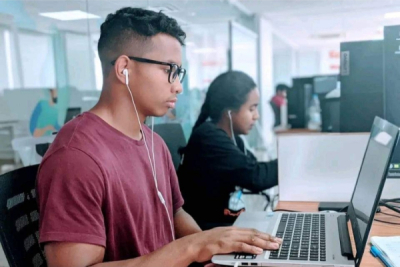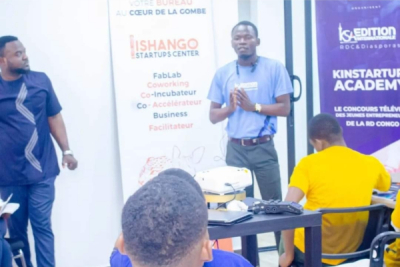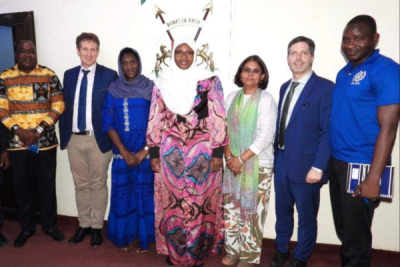An entrepreneur with a passion for technological innovation, he offers cutting-edge technological solutions to SMEs, guiding them towards a successful digital transformation.
Mozambican entrepreneur Edilson Alberto (photo) is the founder and CEO of Tech Solutions, a software company dedicated to solving problems through technology, helping small and medium-sized enterprises (SMEs) grow in their sectors and go digital.
Founded in 2020, Tech Solutions creates solutions to everyday problems. It develops different types of websites, applications, and systems according to its customers' needs. It also does graphic design and takes care of communications and branding for companies.
The company has developed several products. These include SGDoc, E-gado, and Kaia. SGDoc is a system created for public institutions that process mailings and wish to streamline and better control document flow.
E-gado is a system designed for livestock farmers. It enables them to better control their animals and record all kinds of events with them. Kaia, meanwhile, is a platform designed for real estate agents who want to streamline the process of finding homes in Mozambique through technological means.
Alberto, who is currently studying computer science at the Illinois Institute of Technology, also serves as the Director of Entrepreneurship at Intinium, an organization within the institute that empowers students to realize their dreams and pursue their passions.
In addition, he holds leadership roles in several professional associations. He is the Vice-President of the technology sector of the Mozambican Association of Human Resources Companies and Professionals (AMEPRH) and the President of the Technology Department of the Association of SMEs of Mozambique. Since 2019, he has been a lecturer at the Institute of Innovation Technologies and Services in his home country.
Melchior Koba
Burkina Faso has been working to digitize its land sector for several years. The government has launched multiple initiatives to streamline the process as part of these reforms.
Burkina Faso launched a digital platform on Tuesday to collect data on plots of land and housing from private property developers and housing cooperatives, dating back to 2008. The aim is to ensure the accuracy of information and increase transparency in assessing real estate liabilities in private property development.
According to Maxime Tiendrébéogo, Secretary General of the Ministry in charge of Urban Planning and Land Affairs, to collect data for the platform, a commission was set up to collect administrative data from various institutions, including the ministries of Territorial Administration, Economy, and Urban Planning. “At the same time, information was requested from previously approved real estate developers and housing cooperatives, following a certain number of templates.”
The platform will require buyers to provide information on the plot or dwelling, including surface area, cost, the name of the property development company or housing cooperative, and the state of site servicing, such as the opening and resurfacing of access roads, drinking water supply, electricity, and street lighting. All these data are due by March 22.
It is part of the "Fiscal Cadastre" project, which was validated in 2018 by the Burkinabe authorities to digitize the land domain and gain access to important data.
In December 2021, the government introduced an integrated cadastre and domain management system (SYC@D) to better manage the cadastral sections of communes and arrondissements. The system is part of the "Fiscal Cadastre" project, which aims to improve the management of land and real estate in Burkina Faso.
Adoni Conrad Quenum
The Malagasy startup offers educational video courses for middle and high school students. Its app includes free and paid tiers.
Isikaray, an edtech solution developed by a Malagasy startup, offers middle and high school students access to training courses and video lessons. The startup, based in Antananarivo, was launched in 2022 by Louis Venceslas Tsira.
The solution, available exclusively as an Android mobile application, enables users to create an account and access various services including a library of courses and training available for streaming and offline viewing.
Isikaray operates in both free and paid modes. Switching to the paid mode unlocks the full range of features offered by the edtech solution, including a social network where users can interact.
Exclusive packages are available for purchase to access the platform’s content, particularly with the Orange operator. Once a package is activated, its expiry date is displayed at the top of the screen. Before its expiration, users can download their chosen course and training videos, and interact with other high school students via the network.
While Isikaray's training courses are currently uncertified and do not confer diplomas, the startup aims to achieve certification in the future as part of its objectives.
Adoni Conrad Quenum
Since its inception, the company has been dedicated to aiding young entrepreneurs and project leaders in transforming their concepts into profitable businesses. Over the course of seven years, it has provided training and support to more than 500 young individuals.
Kinstartup Academy, a Congolese training academy and startup incubator, has been dedicated to discovering, training, and promoting startups or project bearers wishing to establish their own businesses since its inception in 2017. The academy, founded by President and CEO Shola Deen, provides entrepreneurs with essential resources for their start-ups.
“The academy equips participants with essential information and concepts, everything an aspiring entrepreneur needs to launch into entrepreneurship and develop their business in a concrete and effective way,” Dean explains.
In addition to its training programs, Kinstartup Academy hosts a televised competition for young Congolese entrepreneurs and project leaders. The competition, which has already run for four seasons, offers training and coaching from expert trainers and experienced business leaders. The jury comprises professionals from financial institutions and business management educators.
The academy also organizes several conferences in fields such as edtech and healthtech and has established the Kinshasa Innovation Forum, a major forum dedicated to promoting innovation. Through its Face the Leopards platform, it connects investors with the entrepreneurs it has trained and supported.
To date, Kinstartup Academy has raised awareness among over 50,000 young people, identified over 2,000 project leaders, trained and supported over 500 young people, and created over 1,000 jobs. Beneficiaries of the Academy’s programs include Cedric Onaya, founder of Ebushafu, a digital waste management platform in the DRC, and Josè Rodriguez, founder of Uzuri RDC, an online shopping mall and digital marketplace offering products and services for professional sellers and individual customers.
Melchior Koba
Tunisia officially joined the Council of Europe’s Convention on Cybercrime on Friday, March 8, becoming the 70th state to do so. The convention, adopted in Budapest, is aimed at bolstering international efforts to combat cybercrime.
The Tunisian Ministry of Communication Technologies stated in a press release that the country’s accession to the convention is intended to ensure effective coordination in the fight against cybercrime. It also aims to provide adequate protection for the rights of individuals and victims of such crimes.
Identity theft is rising everywhere. In that context, biometric technology has become a top priority for African countries, which are gradually updating their identity documents.
The International Organization for Migration (IOM) has pledged its support to Burkina Faso in the implementation of its basic electronic unique identifier, a system that has been in progress since 2018. The pledge was confirmed by an IOM delegation, led by Damien Thuriaux, Head of Immigration and Borders Governance, during a meeting with Aminata Zerbo/Sabane, the Minister for Digital Transition, Posts, and Electronic Communications, on Tuesday.
“We had a productive discussion with the Minister in charge of Digital Transition about the various opportunities we have, particularly in terms of digitization of identity management. We also discussed the various projects that Burkina Faso has launched and how we could contribute to their implementation,” Thuriaux stated at the end of the audience.
As part of this future collaboration, Burkina Faso will identify areas where it can leverage IOM expertise. These areas could include the drafting of national identity cards and passports, ensuring these documents meet international standards.
The IOM delegation’s visit comes shortly after the validation of the draft law on basic electronic identification in Burkina Faso. The system aims to uniquely identify a person by combining minimal biographical data and biometric data, providing assurance of a person’s unique identity without undermining the legal attributes and values of other supporting documents such as the national identity card or passport.
The e-ID system in Burkina Faso will be implemented as part of the World Bank-funded West Africa Unique Identification for Regional Integration and Inclusion (WURI) project. The project, which also covers Benin, Senegal, Niger, and Côte d’Ivoire, aims to increase the number of people with a unique proof of identity recognized by the government, thereby facilitating access to basic social services.
Samira Njoya
A self-taught entrepreneur, he boasts 10+ years of experience in the field. He developed a real estate rental platform operating in Gabon and Benin.
Fulgence Menouho (photo), a self-taught entrepreneur with a passion for innovation and growth, is co-founder and CEO of Cabalou, a Gabon-based startup dedicated to helping business travelers and professionals find and book furnished accommodation.
Founded in 2021 by Menouho and Aude Késia Obiang, Cabalou is an accommodation solution designed for professionals, enabling them to book and stay in comfortable, reliable, and well-located accommodation for their activities. The startup's vision is to become the most loved, most used, and most profitable travel platform for professionals in Africa by 2030.
For accommodation owners, Cabalou offers total autonomy, from managing their accommodation to communicating with travelers and hassle-free tracking of transactions. In Gabon, the startup lists 300 apartments, 150 hosts, and has a presence in four cities. In February 2024, it added Cotonou, Benin, to its destination list.
In 2023, Cabalou was selected as part of YouthConnekt Gabon, an initiative of the United Nations Development Program. The startup received technical support and around $166,500 (XAF100 million) in funding.
Between 2014 and January 2024, Menouho independently led and pioneered entrepreneurial ventures, leveraging the Internet to assist individuals across various backgrounds in establishing their home-based businesses for income generation.
Melchior Koba
The Kinshasa-based startup was launched to simplify shopping for residents.
Congolese startup eMart.cd is on a mission to transform the e-commerce landscape by enabling users to shop online for both local and imported products. Founded in 2016 by Bonny Maya, the platform is dedicated to promoting local consumption and providing new outlets for local producers.
“We enable local producers to showcase their products and have new outlets. The Congolese diaspora can supply their families with food, every month, by paying for their order on our website. We encourage and promote products made in Congo, to encourage local consumption. We also market imported products,” says Bonny Maya.
The web-only solution allows users to browse various products without an account, including fruits, vegetables, drinks, juices, and different types of flour. To place an order, users must provide personal information such as their name, country, and billing city. This feature caters to the Congolese diaspora, enabling them to order supplies for their families back home.
Delivery times and rates may vary depending on product availability and delivery zone. eMart.cd integrates various payment methods, including mobile payments, bank cards, and cash on delivery.
Maya has also established a delivery startup to manage eMart.cd orders. This startup not only serves eMart.cd but also partners with other companies for parcel delivery. To support its growth, eMart.cd is exploring additional revenue streams, including advertising for various companies.
Adoni Conrad Quenum
Developed as a digital directory of local artists, the solution was launched, by Gabonese entrepreneur Franck Stéphane Dibault, to promote the works of those artists.
Dengui, a digital platform developed by a Gabonese startup, allows the general public to connect with local artists across all provinces of the country. The startup, launched in 2024 by Franck Stéphane Dibault, aims to simplify the process of finding Gabonese cultural contributors based on user needs and geographical location.
“Dengui, which means "to find" in the Gabonese language Simba, is a platform that facilitates the discovery of Gabonese cultural actors based on the needs of the user and their location. For example, if you are looking for a cameraman in Mouila, the site will display all the cameramen listed in that city, whether they are originally from there or simply residing there,” explains Dibault.
The platform, accessible via a web browser, does not require users to create an account to access an artist’s contact details. It caters to a variety of artists, including musicians, sculptors, painters, photographers, fashion designers, and architects.
To register, artists are required to provide details such as their email address, province of origin or residence, artist name, first and last name, contact numbers, and a profile description. This information facilitates user contact with registered artists, making Dengui a digital directory for arts professionals and enthusiasts.
Users can access an artist’s profile based on their search criteria, providing all the necessary information to contact the artist outside the platform, from social media to email addresses and business telephone numbers.
Adoni Conrad Quenum
An economist turned entrepreneur, she develops digital finance products to meet the needs of individuals and businesses in Zambia.
Evelyn Chilomo Kaingu, a Zambian economist with a background in financial services and technology, is the co-founder and CEO of fintech startup Lupiya. Established in 2016 by Evelyn Chilomo Kaingu and Muchu Kaingu, Lupiya aims to make financial opportunities accessible to all Zambians by simplifying the borrowing process and conditions.
The company offers three loan programs: Personal Loans, Lupiya for Business, and Lupiya for Women. The Personal Loans program provides secured loans and loans backed by a memorandum of understanding, catering to civil servants via Zambia’s integrated payroll and settlement control system (PMEC). Lupiya for Business offers secured working capital loans to help entrepreneurs expand their businesses.
Lupiya for Women serves as a growth partner for women-led small businesses. Under this initiative, women receive management training and best practices for startups, along with financial support through flexible credit facilities. This program provides a financing opportunity for women who lack the financial resources to advance economically.
Kaingu, a 2010 Economics graduate from Cavendish University Zambia, has held various roles in her career. In 2012, she joined The SPAR Group, a South African retailer, as Finance and Administration Manager. She later worked as a data specialist at the World Bank Group in 2015 before dedicating herself full-time to her startup, Lupiya.
Melchior Koba
More...
The Democratic Republic of Congo is modernizing administrative procedures as part of ongoing digital transformation. Through those initiatives, the country seeks to boost economic growth and public well-being with increased efficiency and transparency.
Fonds de Garantie de l’Entrepreneuriat au Congo (FOGEC), the DRC government-backed fund aimed at boosting SMEs’ access to finance, announced on Wednesday, March 6, a partnership with Dutch fintech firm MoneyPhone to digitize the loan guarantee application process for Small and Medium-sized Enterprises (SMEs) in the Democratic Republic of Congo (DRC).
The collaboration aims to implement a digital solution that will expedite the application process for FOGEC’s financial services, replacing the traditional in-person application method. The project is valued at approximately $2 million.
This initiative aligns with the National Digital Plan 2025 and the National Entrepreneurship Development Program, which aim to raise capital for businesses, facilitate credit access, enhance the business environment, digitize administrative procedures, increase the number of businesses, and reduce unemployment.
The new platform is expected to professionalize FOGEC’s services, thereby fostering entrepreneurship and economic growth in the DRC.
Hélène Gakuru Bukara (photo, right), Managing Director of FOGEC, stated, “This is about the youth. We want to tell them that they no longer have to face any obstacles. With this application, all they need is a phone and a connection to present their business plans and get direct access to finance. No more exclusion, long live cohesion and transparency.”
Samira Njoya
Boasting a career of over two decades, she brings extensive experience in the African ICT sector. Having served in key strategic and managerial roles at the Orange Group, she later transitioned to Schneider Electric, overseeing operations across sixty nations.
Senegalese computer scientist Diaretou Madina Gaye Dieng (photo) has been named President of the French-speaking Africa & Islands Cluster of Schneider Electric, a global firm specializing in the digital transformation of energy management and automation. Her appointment was announced on Friday, March 8, 2024.
From her base in Casablanca, Morocco, Dieng will oversee the group’s operations in sixty countries in the Maghreb, West and Central Africa, and the islands. She will be tasked with steering Schneider Electric’s strategy in this region, with a focus on key sectors such as infrastructure, industry, data centers, and buildings.
On her appointment, Dieng stated, “I am honored to join Schneider Electric in this region, and at a crucial time when nations and businesses around the world are seeking reliable partners for their digitalization, sustainability, and decarbonization journey. I look forward to working more closely with all our customers, partners, and key stakeholders from the public and private sectors, academia, and society to create an impact that leads to a more prosperous and sustainable future.”
Dieng holds a Master’s degree in Management Information Systems (1999) from the Centrale Lille Engineering School, a post-graduate diploma in Information Systems Management (2000) from HEC Paris, and is an alumnus of Harvard Business School Executive Education.
Before joining Schneider Electric, she served as Chief of Staff to the Managing Director of the Sonatel Group, which operates in five countries under the Orange brand (Senegal, Mali, Guinea, Guinea-Bissau, Sierra Leone). She joined the group in 2004 as Director of Marketing and Communications for the B2B commercial unit.
During her tenure at Sonatel, Dieng held successive positions as Sales Director for commercial and government customers in the B2B business unit, and Strategy and Business Development Director for the B2B business unit. In 2016, she was appointed President and CEO of Sonatel Business Solutions in Orange Senegal.
Melchior Koba
In Africa, the Chinese tech company is venturing into emerging niches whose potential is becoming apparent with the digital revolution.
Chinese tech giant Huawei is set to establish its new public cloud zone in Africa, located in Egypt. It will be the second on the continent, after the one in South Africa. The project, which has been in the works since last year, is expected to be completed by the end of next year. It was announced by Jeremy Lin, Vice President of Huawei’s Northern Africa region, which spans twenty-eight countries, at a press conference in Barcelona on Tuesday, February 27.
Adnane Ben Halima, Huawei Northern Africa’s Vice President in charge of public relations for the Mediterranean region, elaborated on the decision to choose Egypt as the host for this new cloud zone. Factors include the size of the Egyptian market, which is already a lucrative opportunity for Huawei, and the rapid growth of cloud services in the country, spurred by the government’s digital transformation vision. Egypt’s strategic location, serving as a hub for several terrestrial and submarine broadband connectivity infrastructures, and its geographical position allowing access to West, Central, and East Africa, were also considered.
Ben Halima further explained Huawei’s role as a cloud provider, stating, “We provide infrastructure for customers who want to buy solutions. But we are also public cloud providers. That means we have the same offering as Amazon, Microsoft Azure, etc. We have clouds in China, Ireland, Eastern Europe, and so on. We choose countries in which we have infrastructure that is connected to the region that is going to access it, so that usage is sustainable.”
According to a report by The Insights Partners, a market research and consulting firm, the global cloud computing market, valued at $405.3 billion in 2022, is projected to reach $1,465.8 billion by 2028, with a compound annual growth rate (CAGR) of 23.9%. This growth is expected to be driven by the increasing demand for advanced digital solutions and the adoption of technologies such as AI, 5G, IoT, and edge computing. While the Asia-Pacific, North America, and Europe regions are currently the main contributors to this growth, Africa is also on a rising trajectory, thanks to its growing adoption of digital technologies and increased government support.
The new cloud zone in Egypt will be an addition to Huawei’s existing 85 zones across 30 regions, enabling the company to cater to the increasing demand for affordable cloud offerings in African markets.
Muriel Edjo
African governments increasingly prioritize digitalization to streamline services and combat corruption inherent in bureaucratic processes. To encourage widespread adoption of digitization, improved internet penetration is essential, catalyzing economic developments across the continent, and unlocking numerous opportunities for growth, innovation, and progress.
The National Assembly of Zambia has received 156 Starlink kits from the Ministry of Science and Technology, in partnership with the Smart Zambia Institute, aiming to enhance digital communication and streamline parliamentary operations.
According to the parliament’s release, the kits handed over on February 29th, aim to “facilitate the full implementation of the recently launched My e-Parliament portal and will go a long way in bringing Parliament closer to the People.”
“My e-Parliament” is an online citizen consultation platform launched to “increase citizen participation in Parliamentary programs.” For Malungo Chisangano, First Deputy Speaker of the National Assembly of Zambia, it is a timely gift as the said application requires strong internet connectivity.
Honourable Situmbeko Musokotwane, Minister of Finance, noted the transformative potential of the kits in facilitating communication with constituents, particularly regarding the Constituency Development Fund (CDF), without the need for physical travel.
The donation signals a progressive move towards strengthening democratic processes and promoting inclusive governance in Zambia, enabling efficient and transparent parliamentary engagement.
As of October 2023, according to Mybroadband, Starlink initiated its operations in seven African nations, such as Nigeria, Kenya, and Rwanda, significantly contributing to closing the internet connectivity divide across the continent. Starlink’s provision of dependable, swift internet connectivity to isolated and underserved areas fosters community development through improved educational tools, economic prospects, and communication systems.
Hikmatu Bilali















